Managing Successful Programmes (MSP®) is an established best practice programme management framework, designed to align programmes and projects to organizational strategy and enable enterprise agility. MSP focuses on the delivery of outcomes of benefit, while mitigating risk and actively engaging stakeholders.
MSP consists of a set of principles, themes, and processes that provide a clear roadmap for the programme lifecycle, including larger, more strategic, complex, or multiple projects. MSP is specifically designed to address the most common challenges that organizations encounter when leading investments in change. It is designed to align programmes and projects to organizational strategy and to provide governance. It focuses on the outcomes of benefits, whilst mitigating risks and actively engaging stakeholders.
Managing Successful Programmes (MSP) has been recently (Summer 2024) rebranded as PRINCE2 Programme Management by PeopleCert. There is no change to the content of guidance or the framework itself as a result of this rebranding.
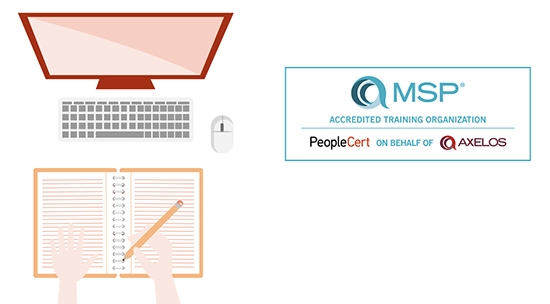
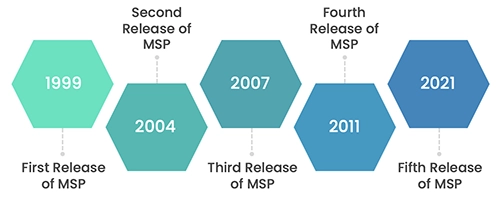
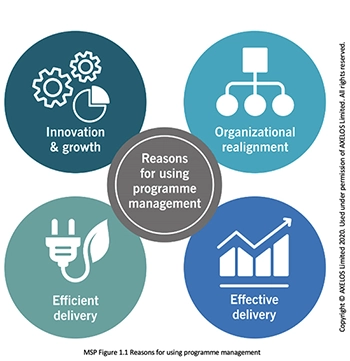
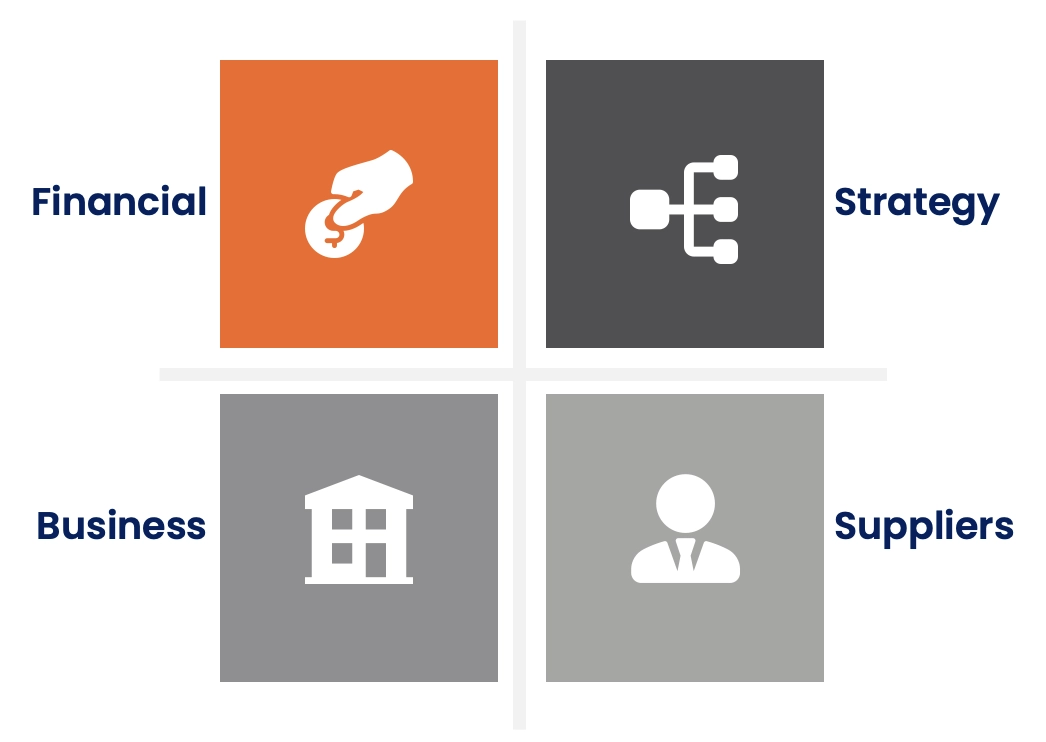
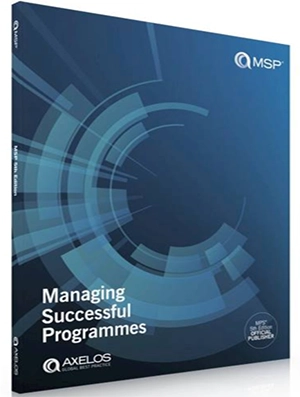
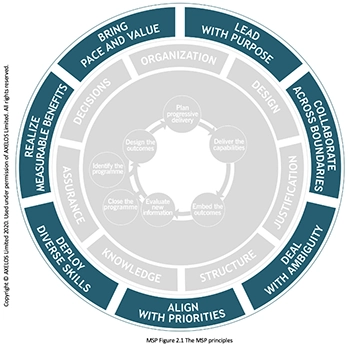
Managing Successful Programmes (MSP) Principles are guiding obligations that apply continually from the first identification of programmes through to their closure.
Principles are built into programme governance through the themes and enacted through the processes in the programme lifecycle.
An MSP programme leads with purpose: envisioning and communicating the desired outcomes.
An MSP programme collaborates across boundaries: facilitating effective cross-organizational governance.
An MSP programme deals with ambiguity: understanding the risks associated with decisions.
An MSP programme aligns with priorities: adapting to new information and emergent change.
An MSP programme deploys diverse skills: meeting the changing needs of the work.
An MSP programme realizes measurable benefits: designing and delivering coherent organizational capabilities.
An MSP programme brings pace and value: justifying the investment in programme management to stakeholders.
Managing Successful Programmes (MSP) themes are an essential aspect of governance required to ensure that the programme is aligned with the principles.
Themes are collectively applied during the processes throughout the programme lifecycle.
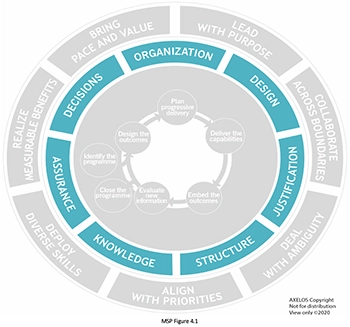
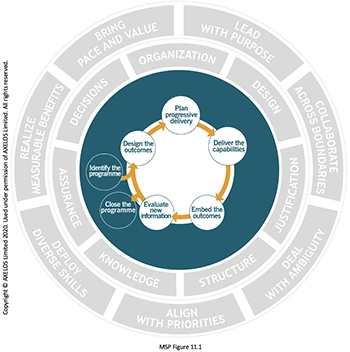
Managing Successful Programmes (MSP) processes are a structured set of activities that define the sequence of actions and their inputs and outputs to achieve a specific objective.
The purpose of the programme’s organization structure is to define the governance boards and supporting offices that are needed to control the definition and delivery of outcomes of benefit within the constraints of the investing organization(s).
The key roles defined by MSP are:
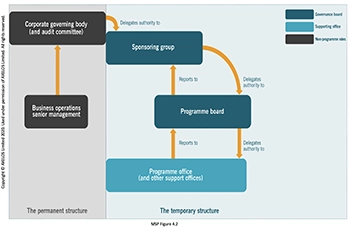



Programmes, by their nature, are agile because they are designed to help realise the benefits incrementally.
Managing Successful Programmes (MSP) is very agile in its nature since it organises the projects and related work into tranches and each tranche is designed to deliver one or more benefits incrementally. An MSP programme can have one or more tranches in the lifecycle.
Managing Successful Programmes (MSP®), 5th edition is an established best practice programme management framework, designed to align programmes and projects to organizational strategy and enable enterprise agility.
Managing Successful Projects with PRINCE2 guide is focused on project management level while MSP is focused on ensuring that all projects within the programme are managed in an organised way and the benefits from the delivery of all projects within the programme are realised. It must be made clear that PRINCE2 and MSP are not competitor, rather they have a parent and child relationship. Neither of these negates or overcomes another one.


Managing Successful Programmes (MSP) certification trainings are provided by PeopleCert's Accredited Training Organizations (ATOs) across the globe. Tecknologia is also a PeopleCert Accredited Training Organization (ATO) offering Managing Successful Programmes (MSP) certification trainings across the globe and in various formats.
| Certification Level | Course Duration (Virtual Classroom) | Course Duration (Classroom) | Certificate Valid for |
|---|---|---|---|
| MSP Foundation | 2 Days | 3 Days | 3 Years |
| MSP Practitioner | 2 Days | 2 Days | 3 Years |
| MSP Foundation & Practitioner | 4 Days | 5 Days | As above |
Click on the links for certification levels to explore the pre-requisites, exams and other details.
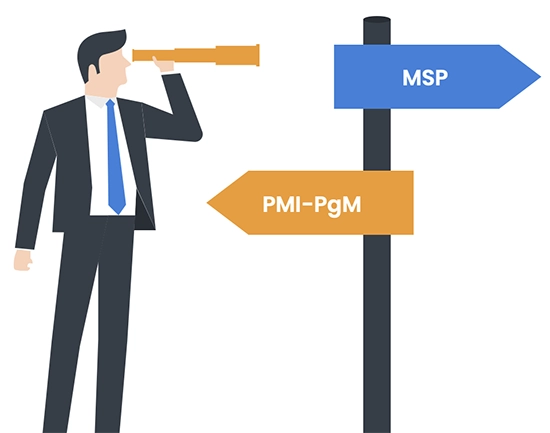
Managing Successful Programmes (MSP) is an established best practice programme management framework, designed to align programmes and projects to organizational strategy and enable enterprise agility. MSP focuses on the delivery of outcomes of benefit, while mitigating risk and actively engaging stakeholders.
MSP consists of a set of principles, themes, and processes that provide a clear roadmap for the programme lifecycle, including larger, more strategic, complex, or multiple projects.
Prices vary depending on the mode of delivery, location, deliverables and the quality of training delivery. Typically MSP Foundation online training costs between £900 and £1500 while MSP Practitioner online training costs between £1100 and £1600. MSP Foundation & Practitioner (combined) online training typically costs between £1700 and £2500.
Following are the pass marks details for Managing Successful Programmes (MSP) exams:
Managing Successful Programmes (MSP) qualifications have helped hundreds of thousands of professionals globally enhance their skills and achieve their professional ambitions. Professionals holding MSP accreditations stand a better chance of being invited for an interview and definitely stand a better chance being offered a role afterwards.
Managing Successful Programmes (MSP) certifications can be a very valuable addition to the list of professional qualifications and accreditations which can help achieve professional growth within organisations, without a need to switch jobs/ employers.
Managing Successful Programmes (MSP) has been and will remain in demand within wider programme management profession today and for coming years.
Managing Successful Programmes (MSP) trainings and certifications are more suitable for professionals with at least 3-5 years of experience in project and programme management. However, some organisations prefer to hire PMO/ PSO support staff who have MSP qualifications.
MSP is the acronym for Managing Successful Programmes and it is a level above project management. Though programmes have relationships with projects planning, initiating, executing, monitoring, controlling and closing, MSP is more concerned with programme level itself rather than project within the container.
Projects are within a programme and not the other way around, similarly project and project management are part MSP and not the other way around.
While MSP exams are relatively hard, with right level of attention and focus one can pass both exams. MSP is not rocket science and anyone with focused training and devotion can definitely achieve success in both exams.
MSP foundation pass rate remains around 80% and MSP practitioner pass rate is around 65% globally, in first attempt. There are training organisations selling false promises of close to 100% success rate in both exams, caution is advised with such organisations.
It is absolutely possible to achieve MSP exam(s) success while relying on self study. However, high standard MSP training can accelerate the process, along with exam success probability, for sure.
MSP Foundation & Practitioner certifications are considered to be professional qualifications only. These qualifications are widely recognized and sought after globally, however, they are not the same as a college or university degree. Some quarters believe that MSP Practitioner qualification is equivalent to UK NQF 6/7 - Tecknologia has no grounds to confirm this.
There is no negative marking in MSP exams. No marks are deducted for a wrong answer.
Both MSP Foundation and Practitioner certifications have validity of 3 years from issuance date. Candidate must retake both exams within 3 years to maintain their certifications. Alternatively, candidates can log Continuous Professional Development points (CPDs) over three years, via paid PeopleCert membership, to maintain certifications.
MSP is the acronym for Managing Successful Programmes and it is a level above PRINCE2 project management, though part of same family of frameworks invented by UK Government originally. programmes have relationships with projects planning, initiating, executing, monitoring, controlling and closing, MSP is more concerned with programme level itself rather than project within the container.
PRINCE2 based projects are within an MSP programme and not the other way around, similarly project and project management are part MSP and not the other way around.